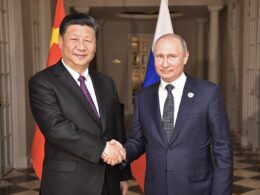Russian authorities have asked India to establish joint production of large-capacity tankers to transport oil, which since December 5 has come under new Western sanctions and a ban on international insurance, Moscow Times writes.
The Russian oil price cap, set by the G7 countries at $60 per barrel, is an "anti-market measure that destroys the international trade system," Deputy Prime Minister Alexander Novak said at a meeting with Indian Ambassador to Moscow Pawan Kapoor.
This creates a "dangerous precedent," he stressed, adding that there is a threat of "energy poverty," in particular in developing countries.
To circumvent sanctions and not depend on the insurance services of European and British companies, according to Novak, Russia and India need to establish cooperation in the construction and leasing of large-tonnage vessels.
Novak added that Moscow welcomes India's decision not to support the price cap on Russian oil.
Since the beginning of the war, India has increased its oil purchases from Russia 36 times - from 30,000 to 1.08 million barrels per day - and has become its largest importer, overtaking China (830,000 barrels per day).
To continue shipments under sanctions, Russia has purchased used tankers, Vladimir Dzhabarov, first deputy chairman of the Federation Council's international committee, said in early November.
"They are quite suitable," he assured, adding that earlier Russian oil was transported by tankers of Cyprus and Greece, and "a big problem" arose with them after the introduction of the price ceiling.
In total, Russia has managed to assemble a "shadow fleet" of at least 103 tankers destined for scrapping, experts from shipping broker Braemar and consulting company Rystad estimated. Among them are up to 29 supertankers (VLCCs), each capable of carrying more than 2 million barrels, as well as at least 30 Suezmax tankers (about a million barrels) and 49 Aframax tankers (700,000 barrels).
However, this is insufficient to maintain oil exports by sea - about 3 million barrels per day.
Shadow fleet of oil tankers prepares to serve Moscow’s interests – Bloomberg




